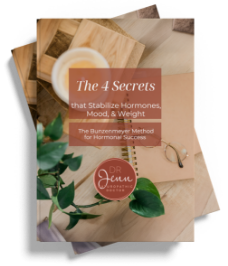When we are stressed initially adrenaline (aka epinephrine) is produced. This triggers an increase in heart rate, blood pressure, blood glucose, increased breathing and sweating. Think “fight or flight” and the old story of the “hunter meeting the tiger” to explain what happens during stress. The hunter’s adrenaline increase causing him to get ready to run- increasing blood flow to his muscles, increasing his breathing, supplying his muscles with blood sugar to help them work – these things help him run from the stress. After a long amount of stress, cortisol is also produced to help him manage through the stress- and is responsible for keeping these symptoms elevated.
Where is the cortisol produced? The adrenal glands are small glands that sit on top of the kidneys- these glands are signalled during stress by the hypothalamus-pituitary glands in our brain as we perceive the stress. The adrenals get the signal and the outer portion of the adrenal glands called the adrenal cortex release the cortisol. This is called the hypothalamus-pituitary-adrenal axis or HPA for short. You will note that our “perception” of the stress is key in our physiologic reaction to releasing cortisol. The more we can change our thoughts and reactions to be less reactive, the more we can control our release of cortisol.
What does cortisol do in our system? Over time if we are chronically stressed and hence causing increased cortisol, this can lead to any of the following:
- High blood pressure
- Diabetes
- Increased sweating
- Mid-abdominal weight gain
- Insomnia
- Anxiety
The question then becomes, what can be done to mitigate and modulate our cortisol response in our body? In reality- what can be done to decrease our perception to the stressors coming towards us? The answer lies in many different places but in short, some areas to look at could include meditation, awareness of our perceptions and changing to a new perception that supports us more wholly, the addition of relaxing activities in our lifestyle, practicing gratitude, consuming a supportive diet that balances blood sugar levels and many more. My experience has been it’s a lifetime of learning and practicing how to change our perceptions and learning these supportive avenues on what we need pending on where we are in our lives. This is the beauty of life- we are always learning, growing and adapting to what we need right now in this moment.


